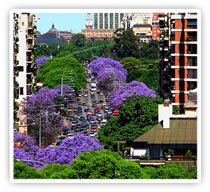 Buenos Aires Travel Information
Buenos Aires Travel Information
Buenos Aires is one of the largest cities in Latin America and offers a wide range of social and cultural activities. The city is generally considered a safe city but all the normal precautions for travelling to an unknown large city apply of course. Buenos Aires is an excellent gateway to explore Latin America and has become very popular as a destination to learn Spanish.
Money
The Argentina currency is the $ (peso) and you can check your currency rates here. Although you can pay in most places with US dollars (USD) and Euros, we suggest that you exchange enough cash for your expenses. There are plenty of ATMs where you will be able to take money from.
Airport
The Jorge Newberry Aeroparque is the domestic airport used for domestic flights. The international airport of Buenos Aires is called Ezeiza (airport code: EZE) and is located 35 km to the south of the city centre. Various airlines fly here from North American (American Airlines) and Europe (Iberia, Air France, Lufthansa).
There are two transportation options for transfers between the airport and the city of Buenos Aires. Passengers can take a bus which departs every half hour, or they can opt for a taxi. It is safest and most economical to reserve a taxi with one of the businesses at the airport as opposed to independent taxi drivers.
Getting around
There are several ways of moving around Buenos Aires: subtes (metro), colectivos (buses), trains, taxis, radio taxis and remises. Taking a taxi in Buenos Aires is easy. There are hundreds of them everywhere and it is not necessary to go to a taxi stop. You just raise your hand when you see a taxi and he will stop.
Climate
The four seasons are clearly distinguished in Buenos Aires. In winter (June to September), the temperatures do not usually go below 0º C, maintaining an average of 8-10º C. In the summer months (December to March), the temperatures are rarely higher than 32º C, maintaining an average of 27º C. Spring and Autumn see average temperatures between 18° C and 20° C.
Electricity
Argentina has a 220V network and you may need an adaptor depending on where you come from.
Daily expenses
Buenos Aires is no longer as cheap as it used to be but not very expensive either. Here's an indication of prices quoted in US Dollars:
Breakfast: croissant + coffee: USD 3.00 - USD 4.00
Lunch: sandwich (bocadillo) + drink: USD 5.00
Lunch: menú del día: USD 10.00
Dinner: grocery shopping: USD 5.00 - USD 7.00
Dinner: "cheap & cheerful" restaurant: USD 15.00
Transportation cost per day: public transport: USD 2.00
Glass of wine: USD 5.00
Glass of beer: USD 2.00
Once you include other costs such as telephone card, entrance tickets to museums / cinema etc. a minimum daily allowance of USD 25 is the minimum to survive on [excluding accommodation].
Meals
Although there is no exact meal schedule in Argentina, breakfast is usually taken during the mid-morning hours, and it is small, usually consisting of coffee or tea, possibly accompanied by toast or pastries. The lunch hour starts around 1.00 or 1.30 pm, and is generally a large meal. Dinner starts at about 9.00 pm at the earliest, and oftentimes much later, and it is also a large meal.
Kiosks
Dispersed throughout the city, you will find hundreds of “kioskos”. These are small shops which sell cigarettes, snacks, and beverages, as well as selected useful products such as aspirin, personal hygiene products, etc. Here you will be able to find these useful products, conveniently available to purchase on the run. The majority of the kiosks remain open late into the night, and some are open 24 hours.
Telephone and Telephone cards
Small public telephone centres are found throughout the city and are called “Locutorios” or “Telecentros”. These businesses offer services including use of phone booths from which you can make local or international calls, fax service, oftentimes mail services, and internet access, generally at a minimum cost of about $2 per hour.
Visitors can obtain pre-paid telephone cards which can be used to pay for calls made from public phones found in Telecentros, Locutorios, and kiosks, or pay phones located in the streets.
Working and Visa
If you stay for less than 90 days, you do not need a visa unless you are a passport holder from one of the Caribbean countries.
If you want to stay longer than 90 days, you can apply for a student visa with the local Argentinean consulate or embassy. Babylon Idiomas will provide you with a letter of acceptance to assist you with your visa request.
No one from outside of Argentina can work without a work visa.






Go to 3rd slide